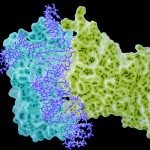Présentation
Two-component systems (TCS) play an important role as to allow organisms to sense and respond to changes in many different environmental conditions. Histidine kinases are one component of many TCS, and are able to catalyze the autokinase, the phosphotransferase and the dephosphorylation reactions involved in the TCS function. Many histidine kinases contain a linker domain HAMP, and conformational
rearrangements of HAMP are thought to play a key role for transferring the signal arising from the external stimulus to the regions performing the autokinase and phospho-transferase enzymatic functions. The exact conformational changes undergone by HAMP are not precisely known, although
several models have been proposed to describe them. We intend to use molecular modeling approaches to explore the space of possible conformations of the histidine kinases, to put in evidence correlations between motions in different protein regions. This permits to describe a model for the transmission
of conformational signal which can be further used to explore the transition between the different enzymatic states of histidine kinases.


